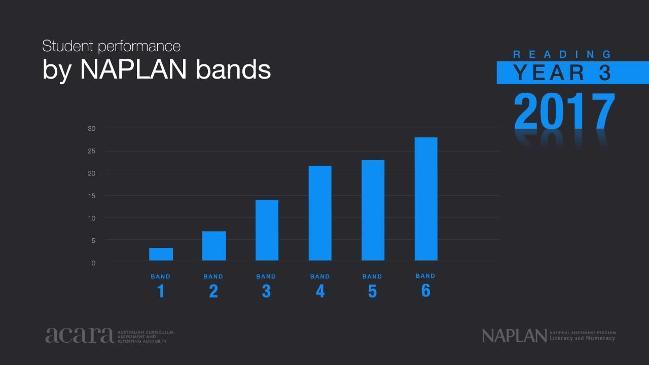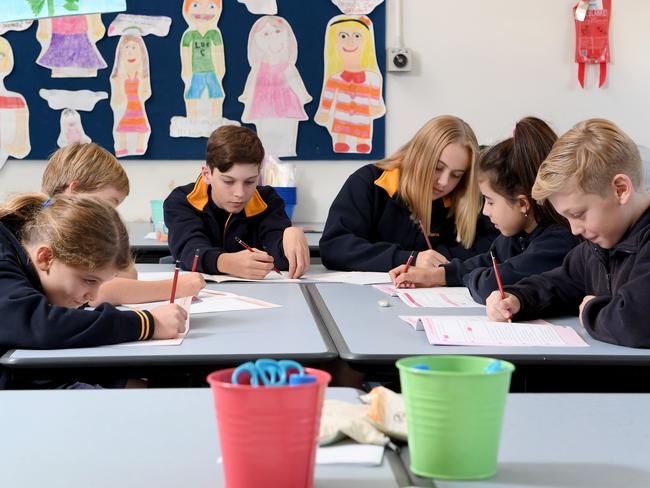NAPLAN results show decline in writing skills
THIS graph shows a catastrophic drop in an essential skill among Australian school students. They’re going backwards - and some states are worse than others.

THE federal education minister has vowed to take action as new figures show writing skills among school students are going backwards.
Simon Birmingham says he will hold talks with his state and territory counterparts to discuss how to turn the worrying trend around following concerning results from NAPLAN literacy and numeracy tests.
The 2017 preliminary results from tests in May were released on Wednesday and show a 2.04 per cent decline in writing skills across all years in Australia since 2011 when the test format changed.
The decline was particularly noticeable for students in Year 3, aged about eight years old.
However, there were improved results for numeracy and reading since 2008, as well as mostly positive results for spelling, grammar and punctuation.
Writing results across Australia vary depending on state and year level, with declines in writing in the Northern Territory — where half the Year 9 students failed to meet the minimum standard — particularly concerning.
This compares with the national average where 81.5 per cent meet the standard.
Other states have also gone into damage control over their poor results with South Australia Education Minister Susan Close announcing this morning that public schools would receive a $67.5 million funding increase.
In South Australia, NAPLAN results were below the national average in every test at every participating level.
Meanwhile Victoria Education Minister James Merlino blamed technology for the state’s poor handwriting results.
“I think that’s part of our concern. Education ministers all around the nation... (are) very firm in the belief that we have to continue (with) primary school-level writing being handwriting,” Mr Merlino told ABC Radio on Wednesday.
Mr Merlino said a balance needed to be struck to ensure students could still write.
“I get concerned if there’s too much focus on technology and devices and I also get concerned if there’s no focus on technology at all,” he said.
Preliminary results show the Victoria’s year 9 students went backwards in writing during the past five years and years 3, 5 and 7 made no improvement in the same period.
On the positive side, Victoria does have the best mean scale scores for reading in all age groups and is also good in spelling but is in the middle of the pack in numeracy.
One of the most improved states has been Queensland, which had more students achieving in the upper two bands than ever before.
But even in states like NSW, which achieved some of its best results since the national tests began, scores are still falling short of expectations.
According to Fairfax, almost 70 per cent of students in NSW will have to sit an extra exam in reading, writing or numeracy to be eligible to sit their Higher School Certificate.
This is because the state government has introduced new standards that require year 9 students who don’t achieve at least a NAPLAN band 8 in reading, writing and numeracy, to pass an online test before they can sit their HSC.
Senator Birmingham said Australia had a high performing education system by world standards but reforms were needed to ensure it kept up.
“It is a worry that writing skills in our children appear to be going backwards,” he told the Seven Network on Wednesday.
“That’s why we have to not just focus on needs-based funding, but also making sure we get maximum bang for our buck in terms of investment.”
The NAPLAN show gradual growth over the past decade in the number of students at the highest levels, particularly among reading results for Year 3 students.
The Australian Curriculum, Assessment and Reporting Authority says the same trend is evident in other areas although it is not always enough to lift national averages.
“What the 10-year data indicates is that change is happening ... and this is to be welcomed,” chief executive Robert Randall said.
“If this improvement can be replicated across more domains, years and states, then a lift in average results nationally will be seen.”
Senator Birmingham said Australia needed to look at what could be learned from high-achieving schools and how that could be applied in other schools.
The government has commissioned businessman David Gonski to lead a review looking at just that, to report early next year.
Opposition education spokeswoman Tanya Plibersek laid blame with Senator Birmingham’s predecessor Christopher Pyne, for scrapping Labor’s conditions to make schools use extra funding to drive improved achievement.
Labor’s targets included getting Australia into the top five countries in the world for reading, maths and science, lifting teaching quality, and giving principals more power.
Mr Randall said the discussion needed to focus on how to replicate what was happening in top-performing schools.
“We can find cases where schools are doing tremendous things because that’s where the difference is made, at the school level,” he told ABC TV.
“We do need to pick up on those and say if it’s working well in these schools, why can’t it work well across a whole range of schools? That’s the nature of the discussion we need to focus on.”




